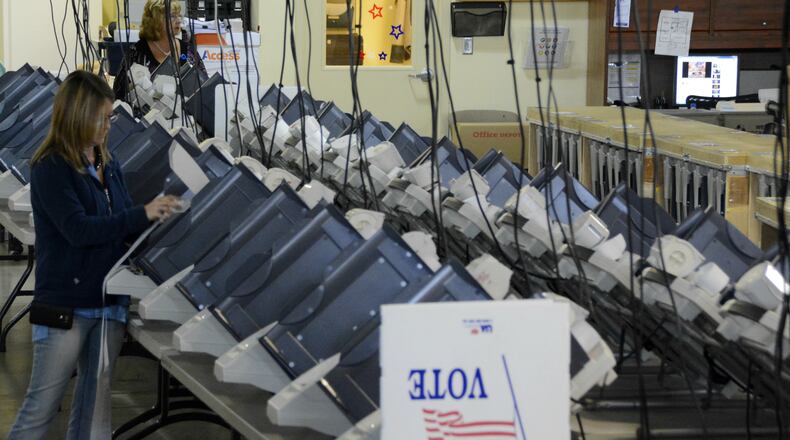“If they are under the impression that this equipment is going to be changed out in the next months, I think they are operating under the wrong assumption,” said Dixon, who added that an 85/15 funding bill from the state would not happen until 2018 or 2019.
RELATED: Butler County tests new voting machines
Butler County has about 1,600 voting machines — 150 are currently broken but are used for spare parts, according to the Board of Elections — that are 12 years old.
In the past five elections — three general elections, one primary and one special election — there were 118 double votes, according to records provided by the Board of Elections. Those happened when issues, such as a machine freezing, occurred and a poll worker issued a new ballot and had those voters vote again. Nearly 90 of those double votes occurred in the March 2016 primary and the November 2016 general elections.
It is going to cost an estimated $3 million to $6 million to get new voting machines. The state originally planned to help counties replace aging equipment next year, but that item was removed from the budget.
MORE: Voting should be easier in Butler County with electronic poll books
Board of Elections Director Diane Noonan told the Journal-News she has contacted the vendor about reinstating the warranty on the machines and inspecting the old machines. She did not have cost estimates on either the inspection or a new maintenance contract.
The Board of Elections dropped the maintenance contract, she said, because it was trying to be fiscally responsible.
“We opted to not extend that warranty because we were trying to be fiscally responsible to our voters,” she said. “We were spending more money on the warranty than covering the cost of anything that was broken.”
Butler County Finance Director Tawana Keels has voiced concern that because the contract lapsed, there could be an additional cost to get the machines back on the maintenance schedule.
“Our challenge is going to be that if the vendor will not let us seamlessly return to that maintenance agreement, they may require us to pay them to come back and certify the condition of our equipment to put it back on maintenance,” Keels said.
Commissioner Cindy Carpenter said leaving the valuable equipment unprotected isn’t prudent.
“I think it’s too high a risk to not support the hardware and software we have in place when we are unsure when the county can afford to replace the equipment,” Carpenter said. “And when the state is going to help us replace that equipment, we just don’t know.”
Dixon said he is also concerned the elections board has stopped using on-site support from its equipment vendor on Election Days, but Noonan maintains that is not necessary.
“We’ve used this equipment for so long we have experienced staff, our staff if excellent on these machines,” she said. “We could always call (the vendor), but we didn’t need them here on site.”
About the Author
